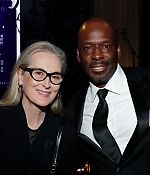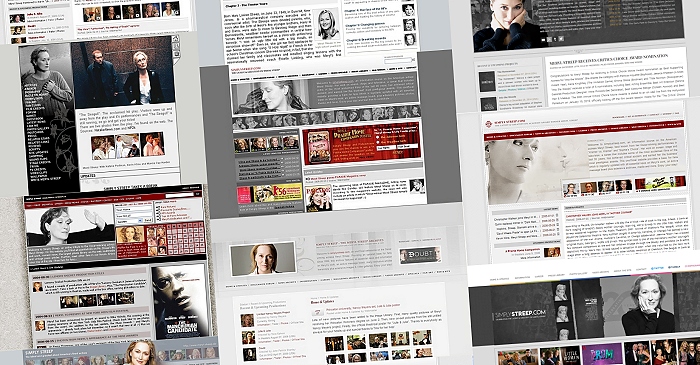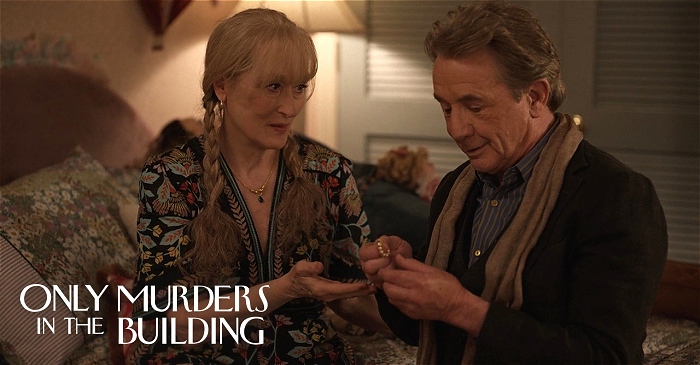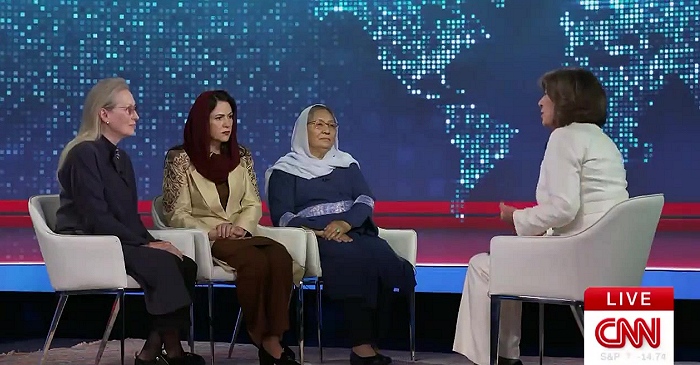
|
Meryl's Choices
The Los Angeles Times ·
September 09, 1990
· Written by Hilary de Vries
|
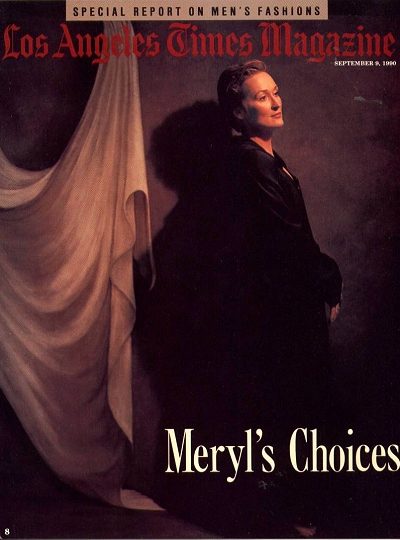
WAIT A minute, say that again.
A woman of a certain age? Not you Meryl, Hollywood’s Young Dame, with the face that launched more than a dozen films and all those Oscar nominations-how many of them were there? Can it be that the country’s most acclaimed actress, a woman in consummate control of her career, is heading into middle age complaining? “Well, I am 40 and in this business, and that’s a cautionary tale,” says Streep, rendering a mild knuckle-rapping in her Upper East Side New York hotel suite. Keep in mind that Streep has spent months playing a character immersed in the indignities Hollywood heaps on her in the about-to-open “Postcards From the Edge.” Based on Carrie Fisher’s quasi-autobiographical novel about women working in movie-industry hell plus or minus a drug habit, the film stars Streep as a post-ingenue, post-Percodan-plying actress with an asp-like (and Fisher-like) sense of outrage. To wit: “Actors are not treated well, and actresses are treated . . .” well, like a common four-letter word.
“It is horrible to admit, but I loved trotting out all those insecurities about being a woman in the movies,” says Streep with a wicked smile. “And I loved being able to say them.” Streep brought a similar wit and outrage to her keynote speech at the Screen Actors Guild’s first women’s conference held last month in Los Angeles. One of the highest-paid actresses in the business, she took Hollywood to task over its dirty little sexist secret. “We all know what the problem is,” Streep declared. “There’s very little work for women. And when we do work, we get paid much less than our male counterparts. . . . And what work there is lately is odd.” This year’s movies? From them one might assume, added Streep, that “the chief occupation of women on Earth was hooking. And I don’t mean rugs.”
You mean “Pretty Woman”?
“Right!” she says, still passionate weeks later. “And I am upset that 15-year-old girls want to go see that four and five times. I know it’s the Cinderella thing, but it disturbs me. There are a lot of women screenwriters and a lot of women in development, but I guess because those women want to make it past the glass ceiling, maybe they think they have to say, ‘Do “Die Hard II.” Now let me be vice president.’ ” Streep has been fortunate enough, and now is powerful enough, to fashion a film career far outside the “Die Hard”/”Pretty Woman” mold, and her resume has a breadth and sweep of unusual dimension. Her many heroines, while not strictly feminists, compose an extraordinary gallery of strong-minded women who are difficult, independent, ambitious-morally ambiguous women out of step with, yet defined by, their times: the discontented wife in “Kramer vs. Kramer,” a political idealist in “Plenty,” a literary adventurer in “Out of Africa,” the femme fatale in “The French Lieutenant’s Woman,” a Holocaust survivor in “Sophie’s Choice,” a betrayed wife in “Heartburn,” a whistle-blower in “Silkwood,” a derelict in “Ironweed,” a murder suspect in “A Cry in the Dark,” among others. All of them were captured by Streep with chameleon-like accuracy. Now comes “Postcards.” There is an expectant buzz about the film. It is Fisher’s first screenplay, a part-fact, part-fiction Hollywood insider story that some say is director Mike Nichols’ best work since “Carnal Knowledge.” And for Streep, “Postcards,” like that SAG speech, is something of a personal breakthrough. After 15 years and 17 films, in which she’s mastered the art of playing the wild-eyed tragic heroine-most often from another country or century-the reclusive, honeyed actress with the icy image and all those Oscars is letting her hair down to play a modern woman who is, as she says, “closest to me, the way I really look, the way I really sound.”
As she heads into her fourth decade, Meryl Streep is acquiring newly assertive roles on screen and off. In her films, she has stepped away from playing starchy, period heroines to star in a series of contemporary comedies. And in her private life, the actress, who has been active in environmental issues-even testifying before Congress-is stirring up discord in her own workplace. “My passion in the whole question-well, obviously I am very well compensated for what I do-but where I felt starved was as a member of an audience, as someone with daughters and a son. Where are their role models like the ones I had when I grew up?” asks Streep in her hotel suite. “Carole Lombard, Katharine Hepburn, Greta Garbo, Bette Davis, Joan Crawford, Lucille Ball-those big, formidable presences who were important people in their films. The women in recent movies increasingly occupy less important places. “I have this theory that in the ’30s it was titillating and fun to imagine Hepburn as Woman of the Year with a male secretary. But now, when 43% of business-school graduates and 46% of law-school graduates are women, it’s not a fantasy anymore.”
And what about money?
“No, I’m not like Jack (Nicholson) with $11 million up front,” says Streep, who is said to command less than half that sum. “I don’t feel greedy, but when Rick Moranis makes what Michelle Pfeiffer makes, when he’s as big a draw, supposedly-who knows what anybody makes because nobody talks about it, but it is all the way down the line until you hit scale-women make 40 to 60 cents on the male dollar.” Streep pauses. “Now, really, that’s all I have to say. I’m not a spokesman. Now I want my brothers in the union to speak up on my behalf. As well as my sisters. I want to hear somebody support us.” The sound you hear, however, is largely that of voices behind closed doors. SAG staffers say that they’ve had “a lot of positive reaction from the industry” since Streep’s speech and that “a number of memos from producers have been written reactivating projects that had (major) roles for women in them.” What that means is that not much is changing. Yet. Says one powerful Hollywood agent who insisted on anonymity: “Bottom line, until there is a huge box-office hit with a huge female star as the lead-and there are only (a few) actresses in the country that currently have that kind of clout-nothing will change.”
Streep is on that short list of actresses carrying a measure of box-office power-along with Sigourney Weaver, Cher, Barbra Streisand, Bette Midler and Michelle Pfeiffer. Which explains why she’s sitting still for the press to talk about “Postcards”-a story about a sexist business told from a woman’s point of view. “I love this movie,” says Streep, on the rebound after a salary dispute with Carolco torpedoed her longtime ambition to play Eva Peron in the on-again, off-again film version of “Evita.” “I want people who don’t go to movies to come out and see this. Before I made my speech, I made an informal survey-people in broadcasting, publishing. You’d be shocked at the number of people in the film industry who don’t go to movies. They don’t go. What I tried to emphasize was that there is an ignored audience and that by going after the 16- to 25-year-old males, maybe they’ve contributed to the shrinking of the general audience. ‘Postcards’ was not conceived as a blockbuster. It wasn’t pre-sold to the Southeast Asian market. But I think it has some real smart talk in it, and if it does well, it will be great for everybody.” Everybody presumably includes women-be they actresses, screenwriters or audience members. Not that Fisher’s novel was a feminist tract, but the movie, starring Streep and Shirley MacLaine, adapted by Fisher from her book, is one of the first adult films released this fall after a summer dominated by Dick Tracy-Total Recall-Die Harder-RoboCop II fare. Fisher: “It’s a story about powerful women and no powerful men.” Nichols: “Do I think it is a feminist film? I think it has feminist elements in it. One of the themes is women as meat.” Oh, yeah, says Streep, “it has this other thing-the relationship between mothers and daughters and how that affects who you are and what you become.”
But let’s back up. It’s mid-August in New York, one of those hazy, end-of-summer days when the avenues are empty, “sale” signs plaster the boutique windows in the East 60s, and everyone with any sense and a decent portfolio is in the Hamptons. But Streep, who lives in the far northwest corner of Connecticut with her husband, sculptor Donald Gummer, and their three young children, is on L.A. time. She’s just back from the SAG conference, the film’s in manic post-production, and next week is the press junket to Las Vegas. She opens the door to her hotel suite herself, and there is that famous face, milky pale with those translucent blue eyes that are at once far away and really, unexpectedly, intense. Not that it’s a hostile or even aggressive look. It’s more like the gaze of an unself-conscious child who is transfixed by the sudden stranger in the room. She offers coffee from a silver pot on the table next to a porcelain bowl full of dried rose petals. “Or can I get you something else?” she asks, pouring, the perfect hostess. She is wearing a salmon-colored silk blazer, a white silk-and-lace blouse, navy blue culottes, navy stockings and Italian leather flats. Armani schoolgirl with a touch of Ralph Lauren. Her hair, too, is tailored, cut short, streaked blonde and sort of shooting straight up off that high, creamy forehead. With the coffeepot in hand she looks like a nice, rich lady from Connecticut in town to see friends.
Except she has that face, that famous face, as faceted as a gem you want to turn in your hands, letting the light catch the planes, all questions of its beauty superfluous. “Too many bones, I think,” says Streep with a slightly self-conscious laugh. She is on the sofa now, letting her initial concentration on her guest grow into something like a passion for interaction. Her eyes are still intense, but the atmosphere is warmer, more engaged now. She is renowned for being an entertaining, if infrequent, interview subject-jumping in and out of accents, rolling her eyes, making jokes. And her voice-now loud, even boisterous, now a hushed flutter-is used to exceptional effect. No wonder cinematographers love to photograph her; she never looks or sounds the same way twice. She has talked about performing-as opposed to simply acting-as being “the final gloss, what attracts the audience to your character.” In a conversation, she subtly demonstrates that connection by spinning a web of complicity; over the course of two hours, she leans forward, her back seldom touching the sofa cushions. She makes you feel that you have become part of the performance, that she is reacting to you. “It’s like one shimmering step beyond behavior,” says Streep. “It’s that extra thing that makes it glitter a little bit.” “Look, 53% of the population is women,” says Streep, reiterating her SAG conference theme. “There are that many stories, that many lives to be explored. (But) there are three prestige pictures a year, which means that three actresses get big parts. That’s it. People look at the roles as a retrospective of you, like you choose the canvas, but that’s simply not true,” she says impatiently. “It has more to do with what people felt was financeable, the accident of what roles are around in a given year.”
Which is how the country’s preeminent tragic actress came to play a drugged-out smart mouth in a comedy. By all accounts, it was Nichols’ idea to cast Streep as Susan Vale, a woman “who gets in her own way,” as the director wryly puts it. Certainly Streep’s work as the coquette in Susan Seidelman’s campy “She-Devil” was amusingly different, if not exactly thigh-slapping. But even in Streep’s more serious roles, Nichols, who directed “Heartburn” and “Silkwood,” looked at her and saw her comic side. “She was very funny in ‘Sophie’s Choice,’ but people didn’t necessarily see it because it was a tragedy,” Nichols says. “But when Meryl decides to be funny, no one is funnier.” So, he sent her “Postcards.” “It was the winter and in the middle of some snowy, horrible, endless night, and I was reading this script and I was laughing so hard and I was so excited that they wanted me to play it. I never really get offered parts like that. I was happy. I was really happy,” says Streep with a really happy smile.



Posted on November 17th, 2024
|
Posted on November 7th, 2024
|
Posted on November 1st, 2024
|
Posted on October 10th, 2024
|
Posted on September 26th, 2024
|



